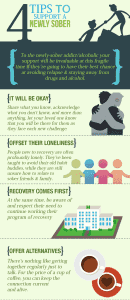“Despite the challenges, families who understand the inevitable ups and downs of early recovery put themselves in a strong position to offer their loved one meaningful support. Equally important, they are better able to maintain their own peace of mind at the path to recovery unfolds – and EVERYTHING CHANGES.” ~Beverly Conyers, Everything Changes: Help for Families of Newly Recovering Addicts  When someone you care about has gone through drug or alcohol rehab and is now home hoping to begin a clean and sober life, you might be worried or anxious about their recovery moving forward and how you should act toward and around them. To the newly-sober addict/alcoholic your support will be invaluable at this fragile time if they’re going to have their best chance at avoiding relapse and staying away from drugs and alcohol. Here are some tips about how you can best help them stay on the right path during their sober journey.
When someone you care about has gone through drug or alcohol rehab and is now home hoping to begin a clean and sober life, you might be worried or anxious about their recovery moving forward and how you should act toward and around them. To the newly-sober addict/alcoholic your support will be invaluable at this fragile time if they’re going to have their best chance at avoiding relapse and staying away from drugs and alcohol. Here are some tips about how you can best help them stay on the right path during their sober journey.
Tip #1 – You Don’t Have All the Answers
 Right now, your friend/loved one is probably consumed with the idea of – “What’s next?” They might honestly have no idea about how to live without the crutches of alcohol or drugs. They may look to you for the answers they need – and you probably don’t have them. And that’s OKAY. You don’t have to have all the answers. Share what you know, acknowledge what you don’t know, and more than anything, let your loved one know that you will be there for them as they face each new challenge. What does this mean? Mainly, it means helping them as much as you can:
Right now, your friend/loved one is probably consumed with the idea of – “What’s next?” They might honestly have no idea about how to live without the crutches of alcohol or drugs. They may look to you for the answers they need – and you probably don’t have them. And that’s OKAY. You don’t have to have all the answers. Share what you know, acknowledge what you don’t know, and more than anything, let your loved one know that you will be there for them as they face each new challenge. What does this mean? Mainly, it means helping them as much as you can:
- If they don’t have a car or a driver’s license, give them a ride to outpatient aftercare rehab or 12-Step meetings.
- When they are feeling tempted or stressed and just need someone to talk to, don’t turn them away – even if it is in the middle of the night or when you’re just sitting down to dinner.
- Be the positive voice that counters all those naysayers who doubt your loved one’s ability to succeed in recovery.
Tip #2 – Proactively Offset Their Loneliness and Isolation
 People new to recovery are often profoundly lonely – they’ve been taught to avoid their old drinking/drug buddies, while they are still unsure how to relate to sober friends and family. Maybe they’ve even isolated themselves because they feel ashamed or guilty about how they may have hurt those around them with their past addictive behaviors. Loneliness can be a trigger for relapse, so make a point of helping your friend/family member avoid a tendency to wallow in self-imposed solitary confinement. Even if they give you the stereotypical, “I’m fine”, left that person know that you still value the relationship and want to spend time with them. Make sure that they understand – explicitly – that nothing can sever your connection – not the past actions, not their efforts at recovery, not even a relapse.
People new to recovery are often profoundly lonely – they’ve been taught to avoid their old drinking/drug buddies, while they are still unsure how to relate to sober friends and family. Maybe they’ve even isolated themselves because they feel ashamed or guilty about how they may have hurt those around them with their past addictive behaviors. Loneliness can be a trigger for relapse, so make a point of helping your friend/family member avoid a tendency to wallow in self-imposed solitary confinement. Even if they give you the stereotypical, “I’m fine”, left that person know that you still value the relationship and want to spend time with them. Make sure that they understand – explicitly – that nothing can sever your connection – not the past actions, not their efforts at recovery, not even a relapse.
Tip #3 – Respect Their Need to Recover
 At the same time, be aware of and respect their need to continue working their program of recovery – and that recovery has to come FIRST.
At the same time, be aware of and respect their need to continue working their program of recovery – and that recovery has to come FIRST.
- They will almost definitely be attending several 12-Step fellowship meetings every week – maybe even every day.
- Hopefully, they will also be participating in an Intensive Outpatient Program (IOP) of recovery from substance abuse. Such programs can meet several days a week, for hours at a time.
- They may be court-ordered to attend other classes or counseling or have to perform community service.
- If they are currently in a sober-living facility, they may even have a curfew that limits their available social time.
In some ways, being in recovery is like having an extra full-time job. “Extra”, because remember – your loved one is probably still going to have to work to support themselves.
Tip #4 – Offer Alternatives to Drinking and Drugging
 It’s YOUR job to help fill their empty time with positive, genuine companionship that is free of drugs and alcohol. Some ideas might include:
It’s YOUR job to help fill their empty time with positive, genuine companionship that is free of drugs and alcohol. Some ideas might include:
- Go to meetings with them–It’s not necessary for you to be in recovery yourself to share your loved one’s experience. However, if you are a friend or family member whose life has been negatively impacted by someone else’s alcohol or drug use, it might do you some good to go to some open Alcoholics Anonymous/Narcotics Anonymous or Al-Anon/Narc-Anon 12-Step meetings.
- Have dinner –Get your loved one out and about by inviting them to your home for a healthy meal, or go out to a restaurant – not bar and grill– and let someone else do the cooking and cleaning.
- Take up a new hobby together – When a person is new to sobriety, their brain actually has to “relearn” how to have fun. It’s a lot easier to try something new if you have someone who will try it with you.
- Keep it simple with coffee and conversation –If time (or money) is an issue, there’s nothing like getting together regularly just to talk. For the price of a cup of coffee, you can keep the connection current and alive.
A person just rediscovering their sobriety is fragile and unsure of himself/herself. Supporting a loved one who is early in recovery doesn’t have to be complicated – but you DO have to make the effort. Just by being there – calm, caring, and committed – you will give your loved one their best chance at long-lasting recovery. Northpoint Recovery can answer your questions about what your role should be when someone you care about is trying to recover from substance abuse – whether alcoholism, illegal drug abuse, or the misuse of prescription medications. Contact an intake specialist today at Northpoint to help your loved one regain hope and health.



